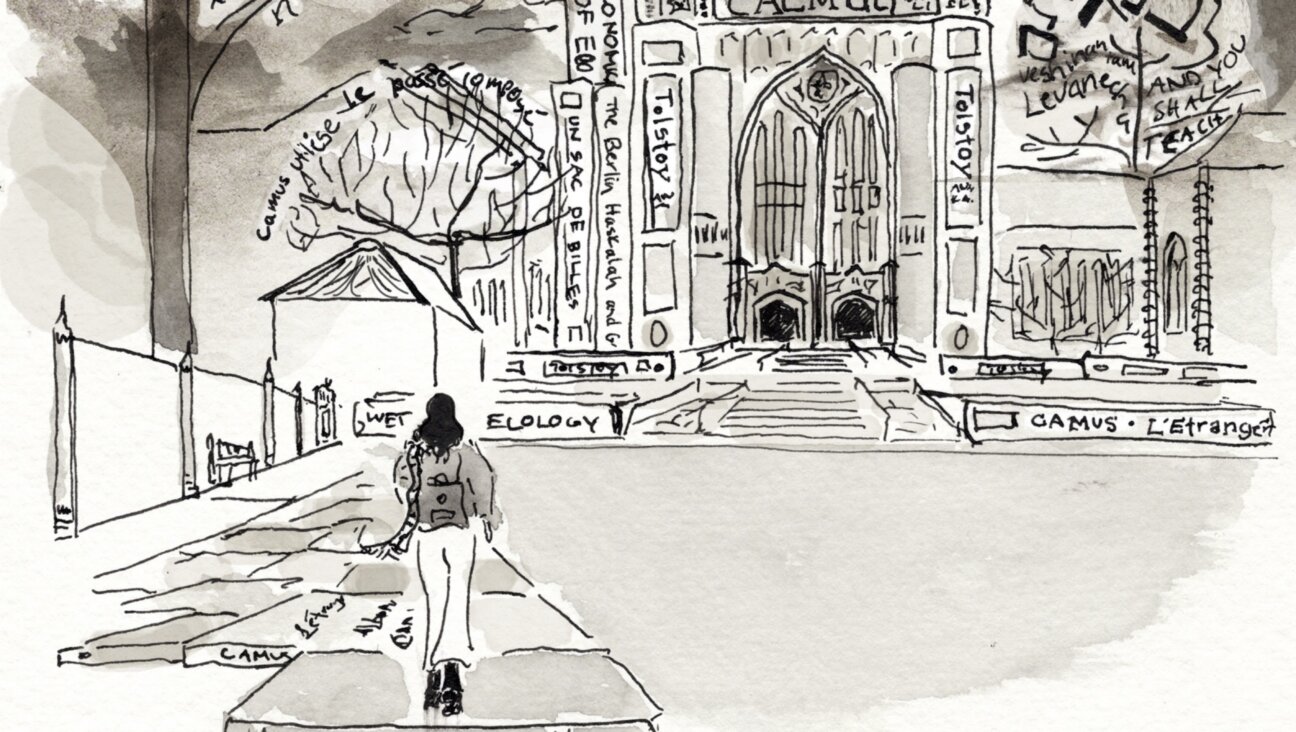Peace, Sharon and, Yes, Shas
Ariel Sharon’s self-imposed coalition crisis has already forced Middle East-watchers around the world, both Jewish and non-Jewish, to re-evaluate their long-held views of Israel’s aging enfant terrible. After a 55-year career of brutal military adventurism and relentless territorial expansionism, Sharon appears to have transformed himself magically in the space of 12 months into the world’s best hope for Middle East peace.
And not just in appearances. In the last two months he has methodically eliminated every alternative path of action, alienating his right-wing base, destroying his governing coalition and leaving himself no way out but one: a peace coalition with parties that endorse his territorial withdrawal plan. For those who had hoped one day to see a ray of hope for peace — particularly those who supposed that Sharon was one of the great stumbling blocks — the transformation is at once breathtaking and humbling.
Now comes the next stage. We are about to be forced to dig even deeper and to re-examine what we thought we knew about Judaism, politics and ourselves. This next transformation can be summed up in a single syllable: Shas.
Shas, the Sephardic Torah Guardians party, holds 11 seats in the 120-member Knesset. Sharon has singled it out as an essential building block in the new coalition he is planning, not for mathematical reasons but for psycho-political reasons. For the secular-minded, liberal-thinking types who make up the majority of the Jewish community in both America and Israel, this will take some getting used to. What could he be thinking?
Mathematically, Sharon could build a peace coalition (more precisely, a Gaza-withdrawal coalition that might open the door to peace) by bringing in the Labor Party, with its 21 seats, and the United Torah Judaism party, with its five. Together with Likud’s 40 seats, that would create a 66-seat majority, a comfortable ruling margin. Neither Labor nor United Torah Judaism objects to Sharon’s Gaza withdrawal — Labor because it favors such compromise, and Torah Judaism because, unlike the Modern Orthodox Jews of the settler movement, it never saw Israeli sovereignty as a theological issue to begin with. True, Torah Judaism has certain demands regarding the role of religion in society, but on inspection they add up to about $67 million in new funds for yeshivas, a fraction of a percent of the state budget. The whole deal is a no-brainer.
Sharon’s problem lies within his own party. The Likud, the party that built its historic identity on rejection of territorial compromise, is having a hard time swallowing Sharon’s disengagement plan. Likud rank-and-file members clearly understand — even if some overheated American and European liberals do not — that the Sharon plan is intended to bring a territorial compromise that results, further down the road, in more sweeping withdrawal and eventual coexistence between viable Israeli and Palestinian states. The Likudniks also understand, even if they did not grasp it a few months ago, that Sharon will stop at nothing to get there. At 75, he has passed the stage of career-building. He’s now gotten to the historical legacy section of his resume.
Sharon’s answer to his right-wingers is to forge a new coalition that balances the left-liberal Labor Party with the more sympathetic Shas. As a Sephardic party, built on Israel’s equivalent of the redneck, Nascar vote, Shas is commonly expected to fight territorial compromise every step of the way and help Likud hold the disengagement to a grudging minimum. That’s been confirmed by a string of recent headlines about Shas’s “flat rejection” of the unilateral disengagement plan that is Sharon’s raison d’être. Moreover, as an ultra-Orthodox party with a deep suspicion of Israel’s courts, media and popular culture, it’s expected to fight Labor on every other issue that might come up. Its widely rumored monetary demands, making the Torah Judaism wish-list look like chump change, are taken as confirmation of that obstreperousness so widely admired on the right.
Nobody, it seems, has read the small print. Shas’s objection is not to disengagement, but to unilateral disengagement. The party’s mentor, the aging Rabbi Ovadia Yosef, has ordered his lawmakers to press for a bilateral process that involves the Palestinians and addresses their needs. Rumors inside the coalition negotiating process suggest that they just might get it, given Sharon’s sense of urgency and the new flexibility emerging from the Abu Mazen administration.
As for those impossible Orthodox monetary demands, it’s instructive to see what Orthodox blackmail looks like, Shas-style. Increased welfare budgets. More money for day care, health care and senior centers. Increased support payments to single mothers. Restoration of basic food subsidies. That’s at the core of the Shas agenda, and has been since the party’s founding. It is the reason for the little-noticed, decade-plus alliance between the progressive wing of Shas (yes, Virginia, there is one) and the social-democratic wing of the Labor Party, or what’s left of it.
During the last decade, thanks to the Thatcherism of Likud and Labor neo-liberals, Israel has been turned from the most egalitarian nation in the industrialized world into the most unequal. The levels of poverty have reached appalling levels, announced last month, that should shame every Jew in the world who ever hoped for a Jewish state living by Jewish values. A Labor-Shas alliance in a Sharon government is the best hope for stopping the slide. We support it.
This is not to gainsay the genuine peril that faces Israel’s social agenda in the months ahead if and when Shas joins with Labor and Likud to form a coalition, as we pray it does. At its best, Shas brings a passionate, deeply regressive social wish list. It intends to roll back recent advances in gay rights, civil unions for interfaith couples, freedom of movement on Saturday and, not least, freedom of worship for non-Orthodox forms of Judaism. And that’s the progressive wing. At its worst, Shas will bring in figures like Rabbi Shlomo Benizri, the former health minister who was said to advocate amulets and incantations as public health measures.
No one will have to swallow harder than the American Jewish community, where questions like recognition of non-Orthodox Jewish practice are genuinely existential issues. If and when Shas enters the Sharon government, as we pray it does, American Jewry will have the fight of its life on its hands. To paraphrase David Ben-Gurion, we must fight for religious pluralism as if there were no peace process, and fight for the peace process as if there were no religious crisis. What’s essential is to fight for the issues that matter, and yet never to lose sight of the issues that matter even more: hunger and death.
















